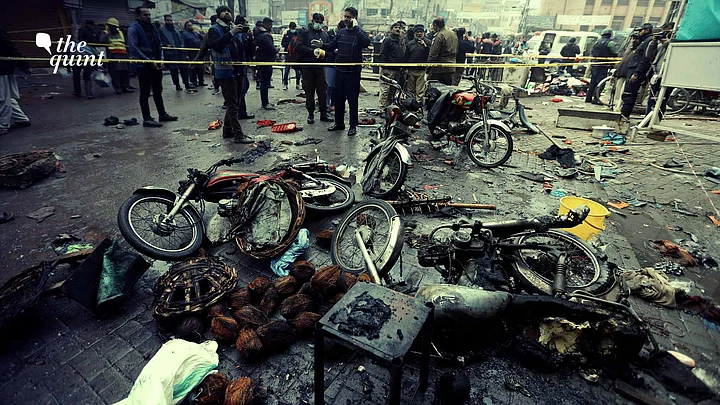With a blast in Lahore at the crowded Anarkali Bazaar, which took three lives and injured 25 civilians, the newly formed Baloch Nationalist Army gets itself in the news for the first time. And with a highly symbolical action rightly labelled by many as a mere act of terrorism, it tries to take its place amongst the older and better-established groups fighting under the umbrella of BRAS, the Baloch Raaji Aajoi Sangar formed a few years ago.
The BNA was created on 11 January from the merging of the Balochistan Republican Army and United Baloch Army, and it had appointed Mureed Baloch as their spokesman. Mureed Baloch, on behalf of the group, claimed the latest attack on social media. The first statement released by the group says: “We accept responsibility for targeting Habib Bank in Anar Kali bazaar, Lahore with explosives. This attack targeted bank employees”.
Other Groups Condemn BNA Action
The 'detailed statement' after some time said: “The targets were the personnel of police including the workers of the bank.” According to BNA: “The purpose of this blast was to record a protest against the worst violence and killing of women and children by the Pakistani forces in Balochistan”. It adopted, it seems, the same strategy of killing civilians or, in other words, acts of terrorism.
The command of BRAS has not commented yet, but it is evident that the strategy inaugurated by the BNA goes completely against any principle and any guideline of the old freedom fighter groups. “No word is strong enough to condemn the killing of civilians in cold blood,” said Mehran Marri, the former Baloch Representative at the United Nations. “This is what Pakistan has been doing in Balochistan for decades, this is exactly what we have been condemning for decades and asking justice for. We fight for freedom, we fight for our land. We are not Pakistan and we'll never stoop to their level”.
On the same page is Brahumdagh Bugti, who strongly condemned the blast in Lahore saying:
”We Baloch are also victim of these kinds of attacks for years by Pakistani Army but still we believe that there is no justification for these kinds of inhuman acts.”
Sher Mohammed Bugti, president of the Balochistan Republican Party, added, “It is a deed of some opportunists trying to gain cheap publicity and further personal agendas.”
Most Baloch leaders, via social media or in private, have labelled the BNA action as shocking and counter-productive. Until now, in fact, the groups fighting under the BRAS umbrella have been leading a war of liberation on Balochistan land and targeting (with few exceptions) police, military and para-military forces. A constant stream of guerrilla actions have been recorded in the past months, and the BLA did in the past few years carry out some high-profile attacks, besides on the Army and police, and also on Chinese workers because of China’s strong involvement in the exploitation of Balochistan and Baloch through the CPEC.
'We Will Carry More Attacks'
Now, the BNA in its statement says: “We will carry more attacks and will further extend it to all commercial cities of Pakistan.” Their justification is that military operations targeting Baloch and the economic exploitation of the land is commanded and decided in Lahore and Rawalpindi.
But many say that adopting the same strategies as, say, the Jaish-e-Mohammed or the Lashkar-e-Taiba, is not going to work well for Baloch, or even for the BRAS itself. Actually, there's only one section that will benefit from further attacks on civilians and from this change of strategy: Pakistan.
Interestingly enough, in fact, if you scratch a bit and look into the background of the advocates and the cheerleaders of this new course of action, you'll find lots of petty bureaucrats involved, in one way or the other, with the state. The ISI will even be glad to have a ground for labelling Baloch as plain, ordinary terrorists, undermining the problem of enforced disappearances, mass graves, extrajudicial killings, the systematic rape and killing of women and children, thus covering up or justifying under the national security blanket any violations of human and civil rights.
Who Benefits From the Cracks?
And all this happens – and this, too, is very interesting – while London is starting a trial against a killer sent by the Pakistani state to kill abroad a Pakistani citizen, a trial that could be the first step to throw some light on the murder of Sajjid Hussain and Karima Baloch.
The supporters of the official narrative in Pakistan are more than happy, at the moment, to point out the umpteenth possible crack in the Baloch movement and between Baloch leaders, between sardars and fighters on the ground. 'Divide et impera' still works very well after a couple of thousand years. And Fanta politics in Pakistan often proves to be much less imaginative than reality. Just ask yourself, then: who will ultimately benefit from a BRAS or some BRAS group becoming just another ordinary terror outfit?
(Francesca Marino is a journalist and a South Asia expert who has written ‘Apocalypse Pakistan’ with B Natale. Her latest book is ‘Balochistan — Bruised, Battered and Bloodied’. She tweets @francescam63. This is an opinion piece and the views expressed are the author's own. The Quint neither endorses nor is responsible for his reported views.)
(At The Quint, we question everything. Play an active role in shaping our journalism by becoming a member today.)
